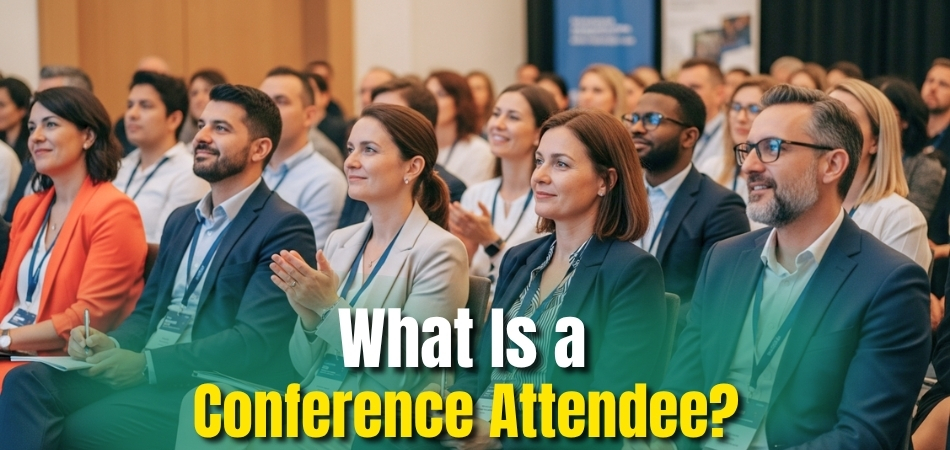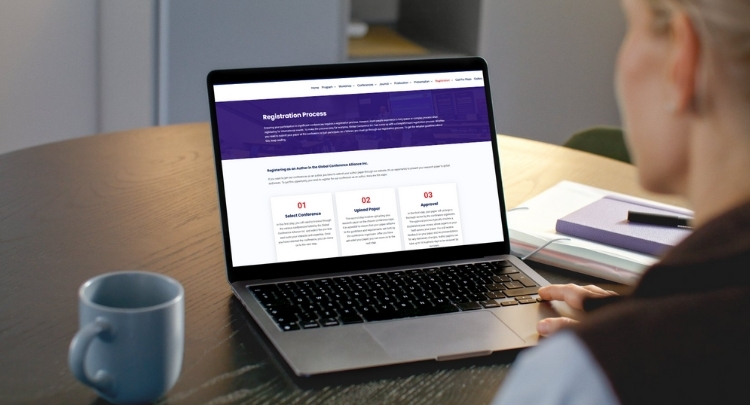In current times, conferences play an important role in learning, sharing ideas, and building strong professional relationships. They bring together people from different backgrounds who share common goals and interests. You might often wonder who joins these events and why they matter, and that thought leads to one simple question: What is a conference attendee?
A conference attendee is a person who takes part in a conference, convention, or similar event. They join to learn, share ideas, and connect with others who work or study in the same field. Attendees may include learners, presenters, sponsors, or even volunteers, each playing a unique role in the event.
Do you want to know more about who attends conferences and what roles they play? Continue reading, because this article shares everything you need to understand about different types of conference attendees and how each one contributes to making events successful.
What Is a Conference Attendee?
A conference attendee is a person who takes part in a conference, convention, or any similar gathering. They join the event to learn, share ideas, and connect with other people who have similar interests or work in the same field. Attendees may come from different backgrounds, such as learners, presenters, or delegates. To know more about who attends conferences, check below for the main types of conference attendees.
Learners
Learners attend conferences mainly to gain new knowledge and skills. They join sessions, workshops, and talks to learn from experts in their field. Many are students, early-career professionals, or anyone eager to grow. They usually take notes, ask questions, and look for ways to apply what they learn.
Networkers
Networkers see conferences as great opportunities to meet new people. They focus on making connections that can help them professionally or personally. You’ll often find them talking to speakers, visiting booths, and joining group activities. For them, every handshake could lead to a future collaboration or job offer.
Presenters
Presenters are the ones who share their work, ideas, or research with others at the conference. They give talks, lead workshops, or present posters. Their goal is to spread information, get feedback, and inspire others. Presenters often help shape the main learning experience of the event.
Organizers
Organizers are the people who make the conference happen. They handle event planning, manage schedules, and make sure everything runs smoothly. They work behind the scenes but play a huge role in the event’s success. Without them, the conference wouldn’t be possible.
Sponsors and Exhibitors
Sponsors and exhibitors are there to promote their brand, product, or service. They often set up booths or give talks to attract potential customers or partners. Their goal is to build visibility and connect with attendees who might be interested in what they offer. These participants bring an exciting business angle to the event.
Influencers and Media Representatives
Influencers and media representatives attend to cover the event and share highlights with their audiences. They might write articles, record interviews, or post updates on social media. Their presence helps spread awareness and attract attention to the event. They play an important role in promoting the conference to a wider audience.
Recruiters
Recruiters attend conferences to find fresh talent and make professional connections. They often represent companies looking to hire skilled individuals. These attendees join networking sessions, talk to potential candidates, and showcase job openings. Their main goal is to match the right people with the right opportunities.
Returning Attendees
Returning attendees are people who have attended the same conference before and choose to come back. They already know the event’s flow and often bring valuable feedback or suggestions. They might guide new participants or reconnect with familiar faces. Their continued interest shows that the conference delivers real value and positive experiences.
Delegates
Delegates are official representatives sent by an organization, institution, or country. They attend to share viewpoints, take part in decision-making, or represent their group’s interests. The main difference between conference attendee and delegate is that attendees usually join for learning or networking, while delegates represent an official body or purpose. Their presence adds importance and formal value to the conference.
Volunteers
Volunteers help with the smooth running of the event by assisting organizers and attendees. They handle tasks like registration, guiding guests, managing booths, or helping speakers. Even though they are not paid, their hard work is key to keeping the event organized. Volunteers often gain great experience and make strong professional connections.
Common Roles of Conference Attendees
People go to conferences to learn, share ideas, and meet others. Some attend to present talks, while others go to explore. Each person has a role that helps the event run well. Keep reading below to learn the different types of attendees and what they do.
Speakers Share Ideas and Knowledge
They take the stage to talk about topics they know well. Many people attend to hear what the speakers have to say. Their job is to inform others using real examples and stories. To learn more, check out how a speaker adds value to events.
Delegates Join to Learn and Network
Most people at a conference are there to listen and learn. They move between talks, attend workshops, and meet new people. Some come with teams, while others attend alone. These delegates take back helpful ideas to use in their work or studies.
Exhibitors Show Products and Services
Companies join as exhibitors to display what they offer. They set up booths where people can stop and ask questions. Many join global events like upcoming conferences in Canada to reach new markets and showcase their ideas. These events help exhibitors grow their network and build long-term business success.
Sponsors Support the Event
These are the brands or groups that help fund the event. In return, they get a chance to be seen by everyone. Their logos appear on banners, flyers, or the event website. Sponsors play a big part in making large events happen.
Organizers Plan and Manage Everything
Behind the scenes, organizers do all the hard work. They choose the venue, set the schedule, and help everyone join smoothly. Without them, the event would not run on time. If you ever wondered who keeps things in order, it’s the organizers.
Panelists Answer Questions and Share Views
They sit in groups and talk about certain topics or trends. A moderator asks them questions that help open up the discussion. The audience also gets to ask things during the panel. You’ll often find great insight during a panel talk.
Volunteers Help the Event Run Smoothly
These helpers take care of small but important tasks. They guide people, hand out papers, or help with sign-ins. Many are students or new workers who want to learn more. Their support helps both the team and the visitors have a better time.
How Can You Register as a Conference Attendee?
Joining a conference is simple when you know the right steps. You can find most registration details on the event’s website. It helps to register early to get better rates and choices. To find out the precise procedures for registering to attend the conference, read on.
Find the Official Conference Website
Start by visiting the event’s official website. Most conferences list full details like dates, fees, and forms there. Always double-check you are on the right site before filling in anything. Once there, look for the registration or sign-up section to continue.
Check Event Dates and Deadlines
Before registering, make sure you know the key event dates. Many conferences offer early-bird discounts if you register soon. Late sign-ups may cost more or have limited spots left. Checking dates helps you plan travel, stay, and budget better.
Choose the Right Ticket Type
Most conferences have several ticket options for attendees. You can pick based on your role, interest, or budget. Read what each ticket includes before making payment. This helps you avoid paying extra for things you don’t need.
Fill Out the Registration Form
After picking your ticket, fill out the online form carefully. Add your name, contact, and any work details if needed. Make sure all information is correct before submitting it. Wrong details can lead to issues later when you check in.
Make the Payment Safely
Once your form is done, the site will lead you to payment. Always use trusted and secure payment methods listed on the site. Save your payment confirmation or receipt after finishing. It will help if you need to check or confirm your booking later.
Get the Confirmation Email
You will receive a confirmation email soon after paying. This email usually includes your ticket and event details. If you do not get it, check your spam or contact support. Keep this email handy for entry or check-in on the event day.
Prepare for the Event
After registering, plan what you’ll need for the conference. Read the event agenda and note the sessions you want to attend. If travel is needed, book hotels and transport early. Being ready helps you make the most out of your experience.
Here’s what you may need to prepare:
- Printed or digital ticket and ID card.
- A notebook or tablet for taking notes.
- Business cards for networking.
- The event schedule or agenda.
- Comfortable clothes and shoes.
- A water bottle and light snacks.
- A list of questions or goals for the event.
Do Attendees Play a Role in Making an Event Successful?
Yes, attendees play a big role in making an event successful. Every person who joins adds value through their presence and actions. When people engage, ask questions, and share ideas, events become more active. Their energy and feedback help organizers improve and make future events even better.
Active participation creates a lively and positive event atmosphere that everyone enjoys. Networking and friendly talks often lead to long-term relationships and teamwork. Many people also gain new ideas that help them grow personally and professionally. This is one big reason why employees should attend conferences and actively engage in them.
Attendees who take notes and share what they learn help others as well. When they share updates online, more people hear about the event. This helps increase awareness and builds a good name for the organizers. Their small actions can make the event reach beyond the walls of the venue.
In short, the success of any event depends on the people attending it. Their presence, interest, and feedback make every conference better each time. Organizers can plan perfectly, but attendees bring the real life to it.
How Can You Be an Active Attendee Instead of a Passive One?
Being active at a conference helps you learn more and connect better. It means taking part, asking questions, and sharing ideas openly. Passive attendees only watch, while active ones get involved in every session. Keep reading below to learn simple ways to become an active conference attendee.
Listen With Full Attention
Paying full attention is the first step to being active. Avoid checking your phone or chatting during talks. Focus on what the speaker is saying and take small notes. This helps you remember key points and understand the topic better.
Ask Questions When You Can
Asking questions shows that you are interested and thinking deeply. It helps clear doubts and makes talks more meaningful. Speakers also like it when attendees engage with their ideas. Try to ask short, polite, and useful questions after each session.
Take Notes During Sessions
Writing down important points keeps your mind active. You can note key facts, quotes, or ideas you find helpful. Notes help you remember and use the information later. You can also share these notes with your team after the conference.
Join Group Discussions
Group talks give you a chance to share and learn from others. You can exchange views, build new ideas, and meet smart people. Being part of discussions makes the event more fun and lively. Try to listen as much as you talk in these groups.
Connect With Speakers and Peers
Meeting new people is one of the best parts of any event. You can introduce yourself to speakers and other attendees. Share your thoughts and learn from their views too. These talks often lead to lasting professional or personal connections.
Share What You Learn
After the conference, tell others about what you learned. You can share notes, slides, or useful ideas with coworkers. It helps spread knowledge and keeps the learning going. Sharing makes your effort more valuable to both you and others.
Stay Active on Social Media
Many conferences have hashtags or pages for online updates. You can post pictures, thoughts, or quotes from the event. This helps you connect with more people and stay involved. Just make sure to post helpful and positive content.
Benefits of Being a Conference Attendee
Attending a conference gives you many chances to learn and grow. You meet new people, listen to experts, and gain fresh ideas. It also helps you stay updated on trends in your field. Read below to see the main benefits of being a conference attendee.
Explore New Ways of Thinking
Conferences open your mind to different ideas and viewpoints. You hear thoughts from people with varied backgrounds and skills. Listening to these talks helps you see your work in a new light. It’s a great way to refresh your thinking and spark creativity.
Turn Ideas Into Real Actions
Hearing about successful projects often pushes you to act. You learn simple steps that you can follow in your own work. Many attendees go home ready to try new methods or plans. Conferences help you turn your thoughts into clear and useful actions.
Strengthen Your Communication Skills
Talking with new people improves how you share your ideas. You learn to listen carefully and speak clearly in groups. These simple talks can boost your comfort with public speaking as well. Over time, such practice makes you more confident in every setting.
Meet People Who Share Your Interests
It’s easy to connect with people who enjoy similar topics. You can share stories, exchange views, and form lasting friendships. These connections often grow into teamwork or helpful advice later. Meeting like-minded people makes the conference more enjoyable and meaningful.
Gain Real Insight From Success Stories
You get to hear real stories from people who achieved great things. Their experiences show how effort and planning lead to results. Learning what worked for them helps you shape your own goals. These stories can be the push you need to move ahead.
Build a Positive Reputation
Active attendees stand out and leave a good impression. People remember those who ask smart questions or share thoughtful ideas. This builds your name in your field and earns respect. Over time, being seen as active and smart can open many doors.
Find Inspiration to Keep Growing
Conferences refill your energy and give you a new purpose. You return home with bright ideas and the drive to act on them. Every talk and chat adds something new to your thinking. This motivation helps you stay excited about your future goals.
Tips to Get the Most Out of Your Conference Visit
A conference can be exciting when you know how to make the best of it. You get to learn, meet people, and grow. Follow these helpful tips below to enjoy every moment and gain true value from your visit.
- Arrive Early to Get Comfortable: Arriving early helps you settle in and find your spot without rushing. It also gives you time to meet people calmly.
- Keep an Open Mind During Sessions: Be ready to hear new ideas even if they sound different. Staying open-minded helps you learn things you might not expect.
- Carry Simple Essentials With You: Keep a pen, notebook, and water bottle handy during long events. Staying prepared keeps you focused and comfortable throughout the day.
- Join Random Tables at Lunch: Sitting with new people helps you meet different minds easily. Great conversations often start over a meal and a smile.
- Take Small Breaks to Refresh: Step out for short breaks when your mind feels tired or full. Fresh air and movement help you stay alert longer.
- Listen More Than You Speak: Give others the chance to share their thoughts fully first. You often learn more by listening closely before responding.
- Collect Contacts the Smart Way: Instead of many cards, connect through LinkedIn or email. Digital contacts are easy to organize and remember later.
- Reflect Each Evening on Learnings: After the event day ends, take a few minutes to review notes. Writing key takeaways helps your memory stay sharp.
- Join Social Gatherings After Sessions: Evening meetups or coffee chats are perfect for relaxed talks. These casual meetings often lead to great personal and professional connections.
- Thank Organizers and Speakers Personally: A short thank-you note or handshake leaves a kind impression. It shows respect and helps you stand out positively.
How Can Conference Attendees Maintain Contact After the Conference?
Meeting people at a conference is great, but staying in touch matters even more. Keeping in contact helps you build strong, lasting relationships. It can also lead to new ideas, projects, or work opportunities later. Here are some of the best ways to stay connected after a conference.
Exchange Contact Details Properly
When the event ends, make sure you’ve saved everyone’s contact details. It’s better to note names, numbers, or social links clearly. Using digital contacts or a phone list helps you avoid losing information. Proper contact sharing keeps the connection alive after the event ends.
Connect on Social Platforms
After the conference, connect through LinkedIn, Facebook, or similar platforms. Send a short message to remind them where you met. Liking or commenting on their posts helps keep you visible. Staying active online helps maintain friendly and professional relationships easily.
Send a Friendly Follow-Up Message
Reaching out a few days after the event makes a good impression. Write a short, kind message thanking them for their time. Mention one topic you discussed to make it personal. This simple step can start a meaningful and lasting connection. Below is a sample follow-up message template you can use:
Subject: Great Meeting You At The Conference
Hi [Name],
It was really nice meeting you at [Conference Name] last week. I enjoyed our chat about [specific topic you discussed]. I’d love to stay in touch and maybe share ideas in the future. Let’s connect on LinkedIn or keep in touch through email.
Best,
[Your Name]
[Your Company or Position, if needed]
Share Helpful Resources or Articles
If you find an article or idea that matches their interest, share it. It shows that you value the connection and care about their field. People appreciate it when others share useful and relevant information. Doing this keeps communication natural and meaningful.
Join Online Groups or Communities
Many events have online groups where attendees stay in touch. Joining them lets you discuss topics, share updates, and meet others again. These groups are great for learning and staying active in your field. Being part of a community helps relationships grow stronger.
Plan to Meet Again
If possible, plan to meet at future events or online calls. Attending the same conference next year keeps friendships growing. Even short meetups help you stay close and exchange updates. Regular meetings make professional bonds stronger over time.
Support Each Other’s Work
You can show support by sharing their posts or attending their sessions. Helping others’ work builds trust and goodwill. It also encourages them to support you in return. Simple acts of kindness often lead to long-term connections.
Keep the Conversation Going
Try to talk once in a while through email or chat. Ask how they are doing or share your new work. These small talks help you stay in their thoughts. Consistent communication is the best way to maintain lasting bonds.
Frequently Asked Questions
Conferences bring people together to learn, share, and connect in many ways. If you’re new to attending one, you might have a few questions about what to expect and how it all works. Below are some helpful FAQs to guide you before, during, and after your conference experience.
What Should You Expect on Your First Conference Day?
On your first day, you’ll usually start with registration and getting your name badge. You can then explore the venue, find session halls, and meet new people. Take time to understand the schedule. Stay calm, follow the signs, and enjoy learning and connecting.
How Early Should You Arrive at a Conference?
It’s best to arrive at least 30 to 45 minutes early. This gives you enough time to check in, find your seat, and settle in before sessions start. Early arrival also helps you meet others and avoid missing important opening talks.
What Kind of Clothes Should You Wear to a Conference?
Your outfit should be clean, comfortable, and suitable for the event type. Business casual works best for most conferences. Avoid overdressing or wearing anything too casual. Choose shoes that are easy to walk in because you’ll move between rooms often.
Are Conferences Only for Professionals?
No, conferences are open to everyone who wants to learn and grow. Many attendees include students, job seekers, small business owners, and teachers. Whether you’re new or experienced, conferences help you build knowledge and connections in your area of interest.
What Should You Bring to a Conference?
Bring your ID, notebook, pen, water bottle, and some snacks. If it’s a business event, carry business cards too. A small bag or backpack helps you keep everything handy. Also, keep your phone charged for taking notes or pictures.
How Do You Choose Which Sessions to Attend?
Before the event, read the agenda carefully and highlight the sessions that match your goals. Focus on topics that interest you most. It’s okay to skip some talks if they don’t fit your needs. Quality learning matters more than quantity.
Can You Attend Conferences Virtually?
Yes, many conferences now offer online or hybrid options. You can join through a video link, attend live sessions, and ask questions. It’s a great choice if you can’t travel or want to learn from home. Just make sure your internet is stable.
How Can You Make a Good Impression at a Conference?
Smile, be polite, and stay active during sessions. Ask smart questions and thank speakers for their time. Be genuine when meeting people. A friendly attitude helps others remember you and may open doors for future opportunities.
How Can You Remember Everything You Learn at a Conference?
Keep short notes during every session. Write down key points, speaker names, and ideas that stand out. Review your notes each evening or after the event. Organizing them helps you remember and use what you learned later.
Are There Rules for Conference Behavior?
Yes, every conference expects attendees to be respectful and kind. Listen quietly during talks, don’t interrupt speakers, and keep your phone silent. Being polite and patient creates a friendly space for everyone to enjoy and learn together.
Concluding Lines
Attending a conference is more than just sitting through talks or meeting new people. It’s about learning, connecting, and finding new paths that help you grow personally and professionally. Every attendee adds something special that makes the event more meaningful and memorable for everyone. Whether you go to listen, speak, or share, your presence truly matters.
So, when someone asks what is a conference attendee?, it’s not just a person in the audience—it’s someone who brings life to the event. Attendees turn ideas into action, create lasting connections, and help shape the success of every conference. If you’re planning to attend one soon, go with an open mind and make every moment count.









